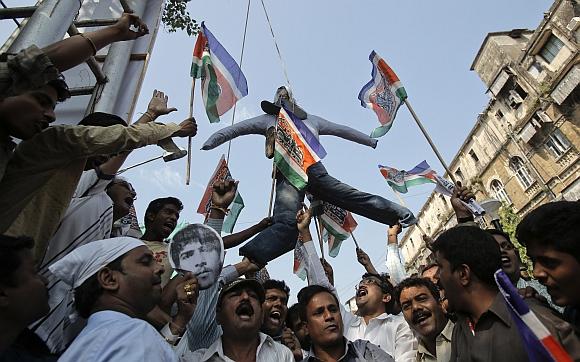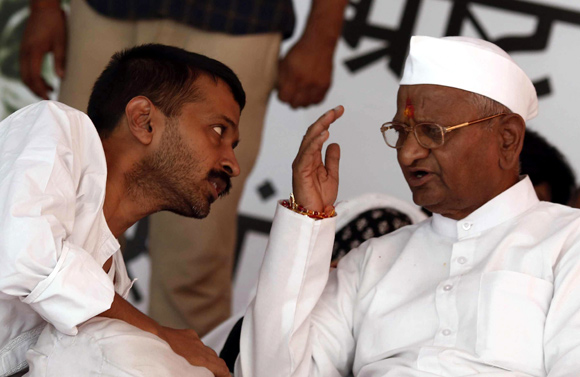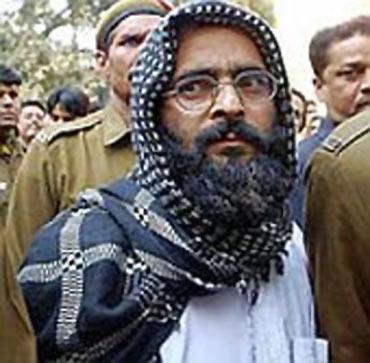
Capital punishment brings the state, the highest invention of humanity, down to the level of the barbarity it is supposed to rise above, says Mihir S Sharma
Obviously, I am being unpatriotic right now. Given the way 26/11 continues to haunt us, and given that, thanks to the extraordinary bravery of Mumbai police officer Tukaram Omble, we managed to capture one of the terrorists alive, we should obviously want to kill him
"Hang him at the crossroads", urged the Gandhian. Yes, there's something wrong with that sentence, isn't there?
Yet two things are certain: one, a certain Kisan Baburao Hazare -- you might remember him, he is a former associate of well-known politician Arvind Kejriwal -- declared, in response to the execution of Ajmal Kasab on Wednesday morning, that it had taken too long and that he had deserved a public hanging, chaurahe pe.
And two, that we are told ad nauseam that Hazare is a 'Gandhian'. This would, of course, be the same Gandhi who declared that "I cannot, in all conscience, agree to anyone being sent to the gallows".
The worst sort of corruption, Hazare, is the corruption of once-noble ideas.
Click on NEXT for more...

But we must pay attention to Hazare. He is, after all, what passes for a moral authority in this great country of ours, his saintly credentials hard-earned through years of whipping people who'd had a drink. (In public, of course. For the good of the village.)
So, when Hazare speaks, it is likely that he reflects the thinking of many of the most upright and admirable of our countrymen -- those who are anxiously awaiting Kejriwal's new party, say, or who imagine the idea to join the anti-corruption movement just occurred to General (Thankfully Retired) V K Singh in October, or who think that Vinod Rai came up with his Rs 1.76 lakh crore figure for 2G spectrum losses in wide-eyed innocence of the media frenzy it would cause.
So let us take Hazare's call for public executions seriously. He is not alone, after all.
That other guardian of India's machismo, Ram Gopal Varma, last seen touring the wreck of the Taj Mahal Hotel after 26/11, has declared that "many, including me, would have relished seeing Kasab being lynched and tortured before being put to death".
I look forward to the movie, sir.
Click on NEXT for more...

And it is not just a question of retribution, please note: Hazare was careful to add that a public execution would have been "a lesson for anybody who causes loss of life in our country". An efficient deterrent!
Of course, it must be, because the Home of Enviable Efficiency, the People's Republic of China holds them, does it not? They have executed thousands of corrupt officials, even, in football stadiums, and completely wiped out corruption thereby. If China does it, our order-and-dictatorship-loving countrypeople will say, not much could be wrong with the idea.
The quite unaccustomed efficiency with which the government went about the execution of Ajmal Kasab is also, apparently, offensive. No bloodthirsty lead-up? No crowds of gleeful people outside the prison, eating papri chat and cheering when the deed is done? How uncivilised.
Here is Varma again, "In the way it was done so completely out of the blue, [it] was very akin to a sudden orgasm without having even a teeny-weeny bit of foreplay." As I said, looking forward to the movie, sir. I have casting suggestions. Call me.
Click on NEXT for more...

Obviously, I am being unpatriotic right now. Given the way 26/11 continues to haunt us, and given that, thanks to the extraordinary bravery of Mumbai police officer Tukaram Omble, we managed to capture one of the terrorists alive, we should obviously want to kill him.
Discomfort with that notion marks you out as disconnected from the deepest desires of the World's Largest Democracy (trademark applied-for). Were you to say, perhaps, that a country is greater the less it lets retribution rule its decisions, then you are deracinated and traitorous.
Were you to admit, perhaps, that capital punishment is still the law of the land -- but, although the government certainly has the right to hang someone, there are some rights which do credit to those who possess them only if they are enjoyed in name only, then you aren't Indian at all. True, that last argument was Gandhi's, but he was over-friendly with Pakistan too, wasn't he? You better remember what we do to people like that.
Click on NEXT for more...

The arguments against capital punishment are well known. There is no evidence that it is a useful deterrent. Especially in countries with justice systems that are far from fool-proof. And even more especially when it comes to those who want to die for their god or their country.
It brings the state, the highest invention of humanity, down to the level of the barbarity it is supposed to rise above. And it coarsens public debate, turning the guardians of public ethics into leaders of slavering mobs. If that is how the India of 2012 wants it, consider for a moment what it means for the other decisions in service of public ethics the mob would have us take.
Don't get me wrong: I have little sympathy for Ajmal Kasab, except as the subject of a punishment I find repugnant. I understand that he was young, deprived, brainwashed, given a gun by evil men and sent out to die. But of all the young and deprived men in that part of Pakistan, he was one of those who chose to be brainwashed into murder. He wasn't forced into it. And I think respecting and understanding that choice of his makes sympathy a little difficult. Nor are most of the others we have on death row sympathetic figures.
But, as the drumbeat begins for the execution of Afzal Guru, whether or not any of us feel sympathy is not a relevant question at all. The only question is: does blood lead to more blood? And the answer is, when the state is the one shedding it, then yes.
Click on NEXT for more...

Click on MORE to see another set of PHOTO features...